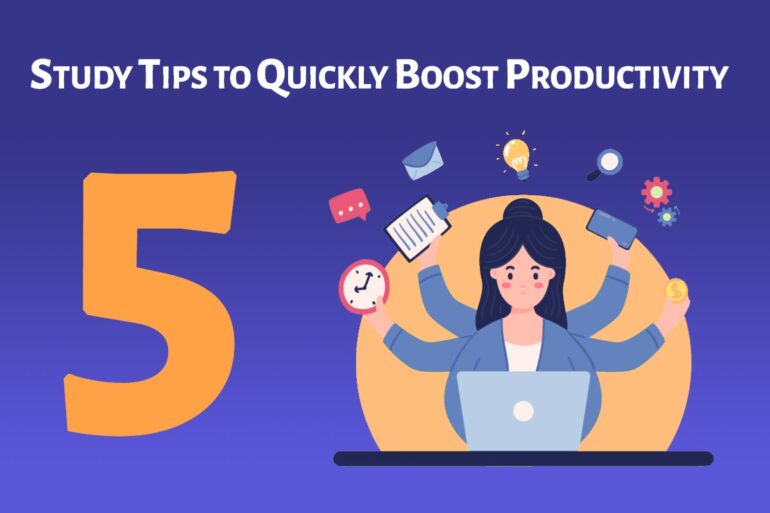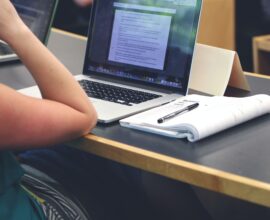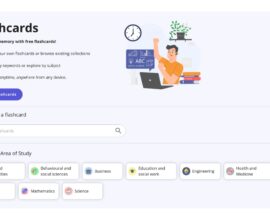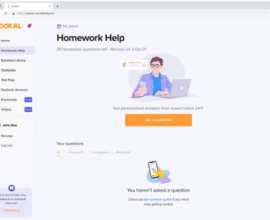5 Study Tips To Quickly Boost Productivity
Exams are a part of life. There’s no getting around them. Whether you’re in high school looking to pass them to open future academic avenues or a final-year university student in the last throes of education, they are integral in mapping out future success.
They are also often a source of great anxiety for many people, with two-thirds of young people admitting to feelings of stress around exam papers. There is often a lot riding them, so it is normal for a person to feel this way.
A lot of this panic comes down to the student often feeling like they didn’t learn the material effectively enough or set aside time to study seriously. They may feel like they were taking notes, all colour-coded and organised, simply for its sake and without committing the information to memory.
Exam study
Fortunately, the test preparation process need not be one full of worry. We have put together five proven tips for effective studying to help you develop effective study skills.
Not every tip will work for everyone, as each individual will have different learning styles and strengths. However, we are confident that you will pick up several effective studying techniques that will help you ace your exams.
1. Stick to your study schedule
There is only a finite amount of time each day, and only a specific slice of it can be set aside for revision and learning. However, your time is likely to be hotly contested by all other aspects of your life, including social events, family commitments, and personal care.
The time dedicated to studying can be haphazard and sporadic and often at the mercy of something more exciting unless you implement robust study routines into your week. To counter this, consider creating a comfortable study space and a weekly study schedule where you can plan your learning around your other commitments.
Our brains require time and repetition to cement information into our long-term memory. Spaced practise periods should be a staple of any effective learning strategy. You should look to space these periods throughout the week and make them shorter in length rather than an extended study period on one specific day.
A dedicated study spot can often help with this, free from distractions. It would be best if you looked to study during the same periods in any given week. Slowly but surely, this commitment will become routine, and once this happens, it will no longer feel like a chore.
Change up your location to keep things fresh and exciting. The same study spot can often lead to lethargy and demotivation for some people. If you are one of those people, try to ensure that your study times remain the same throughout the week.
2. Use active note-taking
Anyone can sit and copy words from a textbook. However, you may easily fall foul of believing this is an effective studying technique. Despite note-taking being a seemingly simple task, writing notes is a skill that needs refining over time.
The result is pages of detailed writing, giving the appearance of productivity but not much retention. There are several ways to make your note-taking more effective:
Be concise
Most passages in textbooks have critical information amongst the litany of extended prose. This essential information is all that is required. Use bullet points, lists, and mnemonics to streamline the amount of written information on the page. This is the first step to making things easier on yourself, as it automatically means less to retain.
Be structured
It is no good to take down a page of concise notes if you cannot make sense of what you wrote when you come to revisit the session later in the week. Separate your notes by subject or topic. Use coloured highlighters and a simple key to give you instant visual access to what means what.
Consider notes by hand
Research indicates that when students use a physical note-taking process rather than a digital one, a student’s memorisation and word recognition are improved. Notes on paper allow for complete customisation for organising the information and assist with reading comprehension.
Vary your note forms
Lists and bullet points are a student’s best friend for revision. However, other forms of note-taking may suit your style of learning. Mind maps are excellent for visual learners, as are diagrams and flowcharts. Audible learners may prefer to learn from recording notes and listening to them back.
Streamline information
When revisiting your class notes, they should already be abbreviated. Why not attempt to challenge yourself and go further?
Transfer the information onto flash cards. Quiz yourself by glancing at the material before trying to summarise the information aloud. It’s all good retrieval practice. Note-taking is one of the most critical studying techniques out there, so you should look to do everything you can to make them as easy to access as possible.
3. Broaden your resources
Revision and subject guides are often tailored for exams and contain summaries of crucial information that allow students to retain information, which is no longer the case. There are now many alternative sources where you can obtain subject material.
Videos are often perfect for quick refreshers and can be ideal study material. You can also use them to break up the process of writing notes and refresh the mind. For almost any subject imaginable, the chances that someone has created a video guide on it are likely high in today’s media-driven world.
You can also make use of past papers and practice questions. Many exam boards make these previous course exams available, giving students an ideal opportunity to see the types of questions they may face and the expectations on those questions in terms of marks on offer.
4. Arrange study sessions
For many people, a problem shared is a problem halved, which can be true when preparing for exams. Studies show that study buddy sessions and arrangements can increase the rate of successful exam passes by up to 72%. Getting together with a friend when it is time to study can have the following benefits:
Maintain motivation
Having someone who understands what you are experiencing is often helpful because what matters to you will almost certainly matter to them. During those moments of procrastination, a friend or peer can remind you of why you are working for this to help get you back on track.
Share knowledge and resources
Often when a peer attempts to convey information, it is more likely to sink in than reading from a textbook or notes. Two heads are also better than one when finding other valuable sources. Though you may well be learning the same material, one of you may have particular strengths in specific topics over the other.
Accountability
Having a study buddy with you on a shared study strategy means that you must succeed for you both to succeed. It is also a practical solution when it comes to deadlines. When it comes to regular studying, and you are going it alone, you are the only person who will be able to keep you focused and in line.
Fun and social
Having a friend study alongside you is an effective studying technique for passing those final exams, but it also makes the process more fun and less daunting. Having someone to talk to during those periods of downtime is often more beneficial than if you were to spend it procrastinating on social media.
5. Look after yourself
This top study tip is not exclusive to when you need to revise for your exams. Students can take several steps to maximise their ability to study effectively and improve their day-to-day well-being.
During your study sessions, ensure that you set time for regular breaks. Too long spent studying without a break will lead to diminished results by the end of your session. If you have been sitting at a desk for an extended period, take yourself outside to stretch and get some fresh air to reinvigorate your body and mind.
Exercise can often help with your study goals. Research has shown a link between exercise and a student’s ability to retain the information if a study session immediately follows a period of physical exertion. A higher number of neurons firing in the brain during exercise increases attention, energy levels and alertness when studying.
Diet also plays a crucial role when learning information. Diets deficient in vitamin B12 can often diminish the ability to retain new information and reduce test scores. Certain foods can improve a person’s ability to study and overall brain health, such as foods high in Omega 3 fatty acids, berries, and even dark chocolate.
Getting enough sleep is essential. The average person should aim for between seven and eight hours per night. When it comes to studying, do not allow yourself to perform all-nighters. While this may give the impression you’ve prepared, you will almost certainly suffer the consequences when processing the information the following day.
ADHD study tips
For students who have ADHD, revising for exams can be particularly daunting, and the study environment could impact learning. While all of the above exam tips are practical study skills for all students, there are additional study hacks you could try if you are someone who suffers from the condition.
Embrace procrastination
Everyone has experienced the urge to procrastinate. Often it takes discipline and willpower to overcome procrastination and not get sidetracked from intended tasks. If you have ADHD, this urge can almost be impossible to overcome, so don’t force yourself. Allow it to happen.
There will come the point when an exam deadline becomes the highest priority, and it is this urgency will finally resonate in your mind and force you to focus. Attempting to push things can often lead to frustration which is no state of mind to be in when studying.
Create a plan and celebrate success
Even though it is often a tricky thing to pull off for students with ADHD, creating and sticking to a plan of action can be beneficial. Please set your playlist to a fixed series of songs to create a daily routine.
Assign each song or group of songs to a particular task so that you know what needs to be done next, and keep the tasks varied. If you are successful in your study session, reward yourself with a treat or a moment of leisure.
Adhere to medication
Only 53% of students who have ADHD stick to their recommended medication plan, which can often be a reason for a student not being able to study effectively.
If you struggle to remember when to take your medication, set regular reminders on your phone. Ensure that you always consult with your doctor to ensure you are on the correct prescription and alter it if necessary.
Learning how to study with Zookal
Effective studying strategies can make or break a final exam. Putting yourself in a position where you can learn to study smarter, not harder and then use them takes time and effort, but the rewards can often be huge.
Since 2011, Zookal has helped students successfully study for their final exams through our range of textbooks and online study tools. Our mission is to provide students with the tools they need to move from high school up to their dream graduate program.





